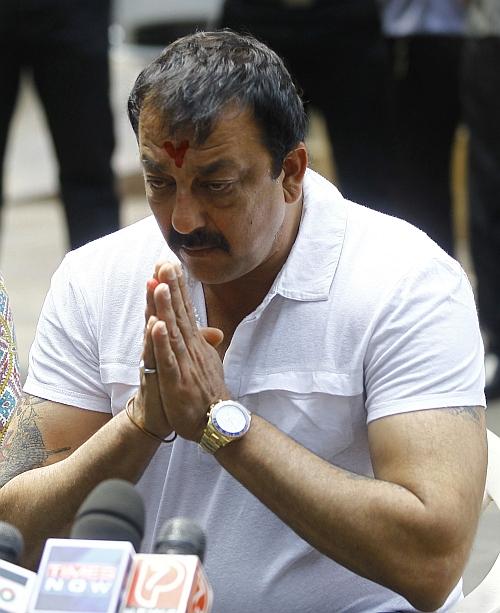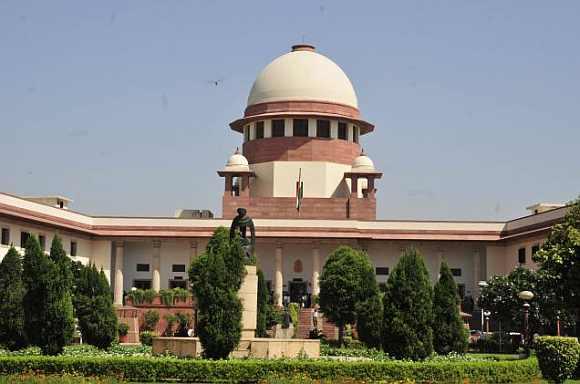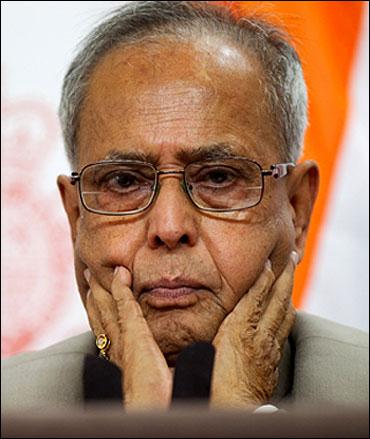 | « Back to article | Print this article |
Dutt case: How far does the power to pardon in India go?
Amid a growing clamour for clemency for Bollywood actor Sanjay Dutt, who has been ordered by the Supreme Court to return to jail to complete a five-year sentence in the 1993 Mumbai blasts case, the man in question has said that he has not sought any pardon and will surrender in time.
Despite his proclamation, former Chief Justice Katju, who kickstarted the debate, has said he would go ahead with this issue and seek a pardon for Dutt. Vicky Nanjappa elaborates on this oft-debated subject.
The most common cases for clemecy are those of life sentences granted by the Supreme Court in which state governments often grant pardon on account of good behaviour.
This has led the Supreme Court to state clearly in some its verdicts that there shall be no pardon or reduction of sentence and a life convict would spend the rest of his life in jail.
Articles 72 and 161 of the Indian Constitution deal with the laws governing to the grant of pardon. These powers vested with the President or the governor could be either absolute or conditional in nature.
Under the absolute grant of pardon, an accused is absolved of the guilt, while in the case of conditional pardon, there are certain obligations that an accused would need to fulfill.
The President or the governor could look into the issue of pardon while considering the public good to save an innocent person and with the hope that pardon could act as an incentive for him or her to behave in future.
Click NEXT to read further...
When the President can grant clemency
The President shall have the power to grant pardons, reprieves, respites or remissions of punishment or to suspend, remit or commute the sentence of any person convicted of any offence:
(a) In all cases where the punishment or sentence is by a court martial;
(b) in all cases where the punishment or sentence is for an offence against any law relating to a matter to which the executive power of the Union extends;
(c) in all cases where the verdict is a death sentence.
Article 161:
The power of governor to grant pardons, and to suspend, remit or commute sentences in certain cases. The governor of a state shall have the power to grant pardons, reprieves, respites or remissions of punishment or to suspend, remit or commute the sentence of any person convicted of any offence against any law relating to a matter to which the executive power of the state extends.
Supreme Court citations:
In the 1981 Maru Ram Vs Union of India case the Constitution of the Supreme Court held that the power under Article 72 should be exercised on the advice of the central government and not by the President on his own.
"The power under Articles 72 and 161 of the Constitution can be exercised by the central and state governments, not by the President or governor on their own. The advice of the appropriate government binds the head of the state.
Click NEXT to read further...
The President or the governor CAN be challenged
In the Kehar Singh & Ors Vs the state (Indira Gandhi assassination) case, the Supreme Court held that pardon by the President is an act of grace and, therefore, cannot be claimed as a matter of right. The power exercisable by the President being exclusively of administrative nature, is not justifiable.
In the Swaran Singh vs the state of Uttar Pradesh, the governor had granted pardon to a life convict.
The court had said, "It is true that it has no power to touch the order passed by the governor under Article 161, but if such power has been exercised arbitrarily, mala fide or in absolute disregard of the 'finer cannons of constitutionalism', such order cannot get approval of law and in such cases. The judicial hand must be stretched to it."
In the Epuru Sudhakar vs the government of Andhra Pradesh case, the Supreme Court said that it is a well-set principle that a limited judicial review of exercise of clemency powers is available to the Supreme Court and high courts.
Granting of clemency by the President or the governor can be challenged on the following grounds as per this order of the Supreme Court:
The order has been passed without application of mind, the order is mala fide, the order has been passed on extraneous or wholly irrelevant considerations, relevant material has been kept out of consideration and the order suffers from arbitrariness.
TOP photo features of the week
Click on MORE to see another set of PHOTO features...



